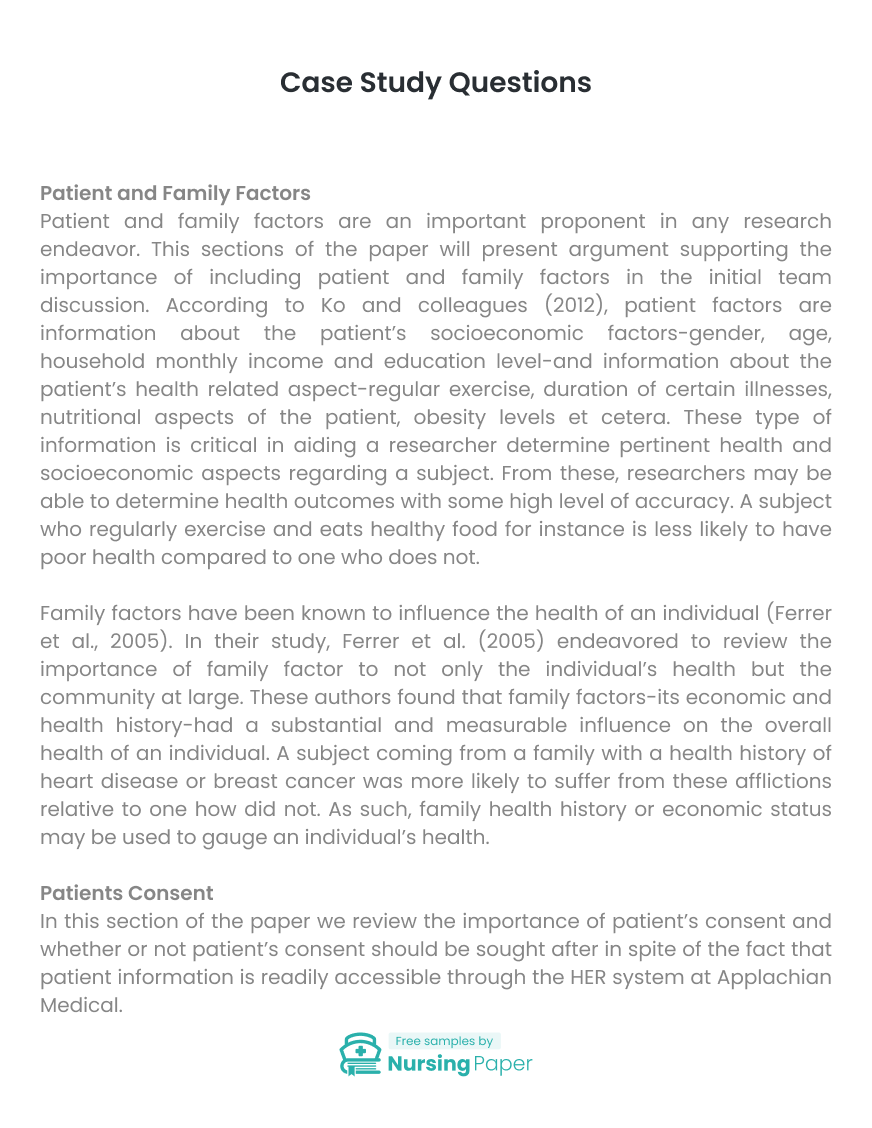
Case Study Questions
Patient and Family Factors
Patient and family factors are an important proponent in any research endeavor. This sections of the paper will present argument supporting the importance of including patient and family factors in the initial team discussion. According to Ko and colleagues (2012), patient factors are information about the patient’s socioeconomic factors-gender, age, household monthly income and education level-and information about the patient’s health related aspect-regular exercise, duration of certain illnesses, nutritional aspects of the patient, obesity levels et cetera. These type of information is critical in aiding a researcher determine pertinent health and socioeconomic aspects regarding a subject. From these, researchers may be able to determine health outcomes with some high level of accuracy. A subject who regularly exercise and eats healthy food for instance is less likely to have poor health compared to one who does not.
Family factors have been known to influence the health of an individual (Ferrer et al., 2005). In their study, Ferrer et al. (2005) endeavored to review the importance of family factor to not only the individual’s health but the community at large. These authors found that family factors-its economic and health history-had a substantial and measurable influence on the overall health of an individual. A subject coming from a family with a health history of heart disease or breast cancer was more likely to suffer from these afflictions relative to one how did not. As such, family health history or economic status may be used to gauge an individual’s health.


Patients Consent
In this section of the paper we review the importance of patient’s consent and whether or not patient’s consent should be sought after in spite of the fact that patient information is readily accessible through the HER system at Applachian Medical. The law stipulates that patient’s consent must be sought after before the commencement of any research. According to the Belmont Report, seeking patient’s consent is important because it ensures that the subjects in the study are treated with respect. Effectively, the researcher views them as autonomous individuals with a right to make their own decisions and choices. Further, seeking patient’s consent ensures beneficence-the endeavor to minimize risks of harm while simultaneously maximizing potential benefits. Lastly, seeking patient’s consent highlights some form of justice. Effectively, patients dims the researcher as a person who has treated them justly and fairly.
1. Department of Health, E. (2014). The Belmont Report. Ethical principles and guidelines for the protection of human subjects of research. The Journal of the American College of Dentists, 81(3), 4.
2. Ferrer, R. L., Palmer, R., & Burge, S. (2005). The family contribution to health status: a population-level estimate. The Annals of Family Medicine, 3(2), 102-108.
3. Ko, K. D., Kim, B. H., Park, S. M., Oh, S. I., Um, C. S., Shin, D. W., & Lee, H. W. (2012). What are patient factors associated with the quality of diabetes care?: results from the Korean National Health and Nutrition Examination Survey. BMC public health, 12(1), 689.



The download will start shortly.

The download will start shortly.
 Subject:
Nursing
Subject:
Nursing  Number of pages: 4
Number of pages: 4  Subject:
Health and Social Care
Subject:
Health and Social Care  Number of pages: 7
Number of pages: 7  Subject:
Medicine
Subject:
Medicine  Number of pages: 4
Number of pages: 4  Subject:
Health and Social Care
Subject:
Health and Social Care  Number of pages: 7
Number of pages: 7  Subject:
Medicine
Subject:
Medicine  Number of pages: 2
Number of pages: 2  Subject:
Health and Social Care
Subject:
Health and Social Care  Number of pages: 2
Number of pages: 2  Subject:
Medicine
Subject:
Medicine  Number of pages: 17
Number of pages: 17  Subject:
Medicine
Subject:
Medicine  Number of pages: 2
Number of pages: 2  Subject:
Nursing
Subject:
Nursing  Number of pages: 3
Number of pages: 3  Subject:
Health and Social Care
Subject:
Health and Social Care  Number of pages: 2
Number of pages: 2  Subject:
Medicine
Subject:
Medicine  Number of pages: 6
Number of pages: 6  Subject:
Medicine
Subject:
Medicine  Number of pages: 3
Number of pages: 3  Subject:
Nursing
Subject:
Nursing  Number of pages: 3
Number of pages: 3  Subject:
Nursing
Subject:
Nursing  Number of pages: 13
Number of pages: 13  Subject:
Health and Social Care
Subject:
Health and Social Care  Number of pages: 2
Number of pages: 2 
